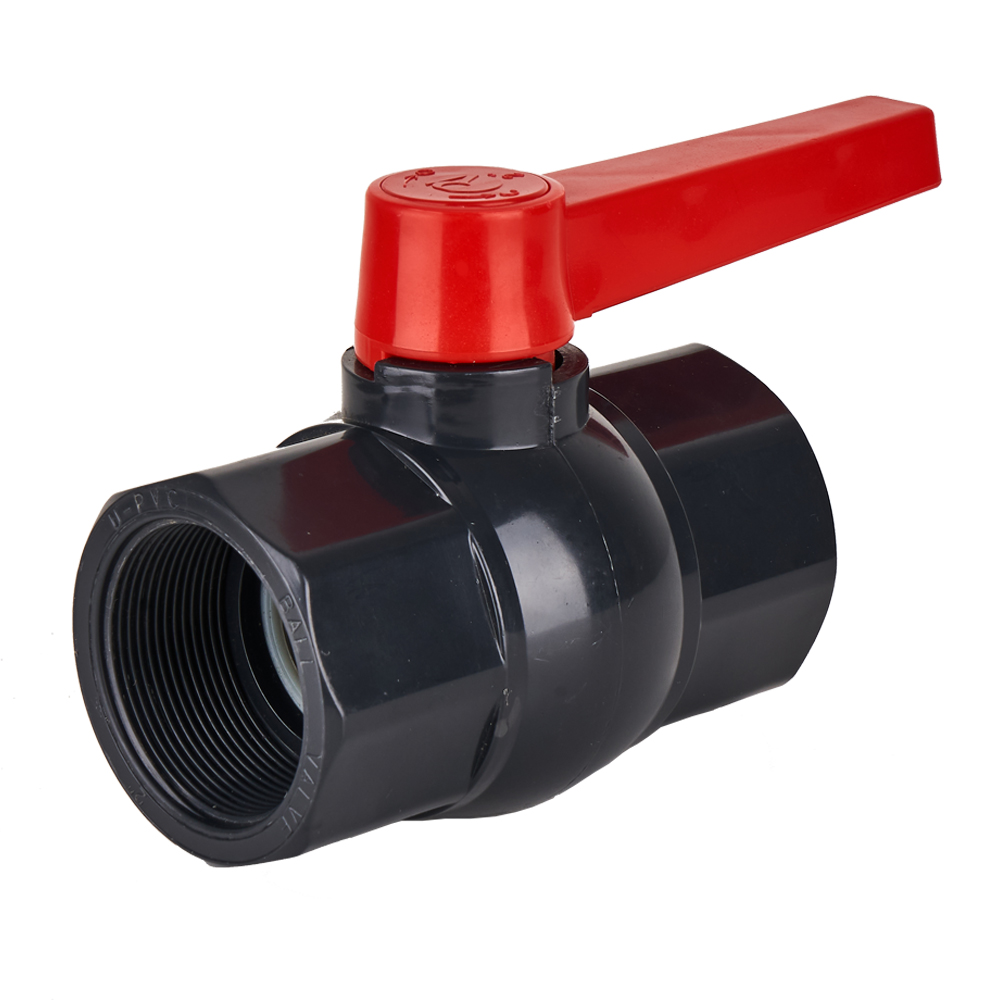
PVC ball valves provide a reliable solution for modern plumbing systems. Their durable construction ensures long-lasting performance under demanding conditions. These valves offer exceptional versatility, making them suitable for diverse applications. Their user-friendly design simplifies installation and operation, while their cost-effectiveness makes them an ideal choice for both residential and commercial plumbing projects.
Key Takeaways
- PVC ball valves are strong and last a long time. They do not rust or wear out, making them great for homes and industries.
- These valves are affordable and work well. They cost less than metal ones, which helps save money on projects.
- They are light and easy to install. This saves time and effort for workers and people doing it themselves.
Overview of PVC Ball Valves
What Is a PVC Ball Valve?
A PVC ball valve is a plumbing component designed to control the flow of liquids or gases through a pipeline. It features a spherical ball with a hole in the center, which rotates to either allow or block the flow. The valve operates with a simple quarter-turn mechanism, making it highly efficient and easy to use. PVC, or polyvinyl chloride, is the primary material used in its construction, offering a lightweight yet durable solution for various plumbing needs. These valves are widely recognized for their reliability and versatility in both residential and industrial applications.
Key Features and Design
PVC ball valves stand out due to their innovative design and practical features. The compact structure ensures they fit seamlessly into tight spaces, making them ideal for modern plumbing systems. Many models, such as the 2” PVC Octagonal Compact Ball Valve, include advanced features like a built-in handle tool for easy adjustments. The use of PVC material provides excellent resistance to corrosion and chemicals, ensuring long-term durability. Additionally, these valves are engineered to handle high pressure and temperature conditions, making them suitable for demanding environments.
Common Uses in Plumbing Systems
PVC ball valves are commonly used in a variety of plumbing systems. In residential settings, they regulate water flow in kitchens, bathrooms, and outdoor irrigation systems. Commercial applications include managing fluid flow in HVAC systems and water treatment facilities. Industrial uses often involve chemical processing and manufacturing pipelines. Their adaptability and efficiency make them a preferred choice for professionals and DIY enthusiasts alike.
Key Benefits of PVC Ball Valves
Durability and Longevity
PVC ball valves are built to last. Their robust construction ensures they can withstand wear and tear over time. Unlike metal valves, they resist rust and degradation, even in challenging environments. This durability makes them a reliable choice for long-term plumbing projects. Whether used in residential or industrial systems, these valves maintain their performance for years.
Cost-Effectiveness and Affordability
Affordability is a key advantage of PVC ball valves. Their production costs are lower compared to metal alternatives, making them an economical option for budget-conscious projects. Despite their lower price, they deliver high-quality performance. This combination of cost-effectiveness and reliability makes them a preferred choice for professionals and homeowners alike.
Corrosion and Chemical Resistance
PVC ball valves excel in environments where exposure to chemicals or moisture is common. The PVC material resists corrosion, ensuring the valve remains functional even in harsh conditions. This feature makes them ideal for applications involving water treatment, chemical processing, or irrigation systems.
Lightweight and Easy Installation
The lightweight nature of PVC ball valves simplifies installation. Their reduced weight compared to metal valves minimizes strain on pipelines and makes handling easier. This feature benefits both professional plumbers and DIY enthusiasts, saving time and effort during setup.
Ergonomic Design for User Convenience
Many PVC ball valves feature user-friendly designs. For instance, models like the 2” PVC Octagonal Compact Ball Valve include built-in handle tools for easy adjustments. These ergonomic features enhance usability, allowing for smooth operation and maintenance.
High Pressure and Temperature Tolerance
PVC ball valves are engineered to handle high pressure and temperature conditions. With ratings of up to 240 psi and 140°F, they perform reliably in demanding applications. This capability ensures their suitability for both residential and industrial systems, including hot water and high-pressure pipelines.
Applications of PVC Ball Valves

Residential Plumbing Systems
PVC ball valves play a vital role in residential plumbing systems. Homeowners rely on these valves to control water flow in kitchens, bathrooms, and laundry rooms. Their lightweight design simplifies installation, making them a popular choice for DIY projects. These valves also ensure efficient operation in outdoor irrigation systems, helping maintain gardens and lawns. Their corrosion resistance makes them ideal for long-term use in areas with high moisture levels. The compact size of certain models, such as the 2” PVC Octagonal Compact Ball Valve, allows them to fit seamlessly into tight spaces, ensuring convenience for homeowners.
Commercial Plumbing Systems
Commercial plumbing systems demand reliable components to handle high usage and varying conditions. PVC ball valves meet these requirements by offering durability and efficiency. Businesses use these valves in HVAC systems to regulate water flow and maintain optimal temperatures. They also find applications in water treatment facilities, where precise control of fluid flow is essential. The ability to withstand high pressure and temperature makes these valves suitable for commercial kitchens, restrooms, and other high-demand environments.
Industrial and Specialized Applications
Industries often require valves that can handle harsh chemicals and extreme conditions. PVC ball valves excel in such environments due to their chemical resistance and robust construction. Manufacturing plants use these valves in pipelines to manage the flow of liquids and gases. Their high-pressure tolerance ensures reliable performance in demanding applications. Specialized industries, such as chemical processing and pharmaceutical production, benefit from the versatility and reliability of these valves.
Use in Irrigation and Water Treatment Systems
Irrigation systems rely on PVC ball valves to regulate water distribution efficiently. Farmers and landscapers use these valves to control water flow in drip irrigation and sprinkler systems. Their lightweight design and ease of operation make them a practical choice for large-scale agricultural projects. In water treatment systems, these valves ensure precise control of water flow and chemical dosing. Their resistance to corrosion and chemicals enhances their performance in environments where water quality is critical.
Quality and Standards of PVC Ball Valves
Compliance with Safety and Hygiene Standards
PVC ball valves adhere to stringent safety and hygiene standards, ensuring their suitability for diverse applications. Manufacturers design these valves to meet industry regulations, prioritizing user safety and system reliability. For plumbing systems, compliance with standards such as NSF/ANSI 61 guarantees that the valves are safe for potable water use. These certifications confirm that the materials used in the valves do not leach harmful substances into the water supply. Additionally, the smooth internal surfaces of PVC ball valves minimize the risk of bacterial growth, making them ideal for systems requiring high levels of hygiene, such as food processing or pharmaceutical pipelines.
Environmental Advantages of PVC Material
PVC material offers significant environmental benefits, making it a sustainable choice for plumbing systems. The production process of PVC consumes fewer natural resources compared to metal alternatives, reducing its overall environmental footprint. PVC ball valves are lightweight, which lowers transportation emissions during shipping. Furthermore, PVC is recyclable, allowing for the reuse of materials at the end of the product’s lifecycle. This recyclability contributes to waste reduction and supports eco-friendly practices. By choosing PVC ball valves, users can align their projects with sustainability goals while maintaining high performance and durability.
Certifications and Industry Approvals
PVC ball valves undergo rigorous testing to achieve certifications and industry approvals. These certifications validate the quality, safety, and performance of the valves. For example, valves like the 2” PVC Octagonal Compact Ball Valve often meet ISO and ASTM standards, ensuring their reliability in various applications. Industry-specific approvals, such as those from the American Water Works Association (AWWA), further demonstrate their suitability for specialized uses. These certifications provide assurance to professionals and homeowners, confirming that the valves meet or exceed industry benchmarks for quality and performance.
PVC ball valves provide a dependable solution for plumbing systems. Their robust construction, affordability, and adaptability make them suitable for diverse applications. These valves ensure efficient performance and long-term reliability. Professionals and homeowners can confidently select a PVC ball valve for their next project to experience its numerous advantages.
FAQ
What makes PVC ball valves better than metal valves?
PVC ball valves resist corrosion, weigh less, and cost less than metal valves. Their chemical resistance and ease of installation make them a superior choice for many applications.
Can PVC ball valves handle hot water systems?
Yes, PVC ball valves can handle hot water systems. Models like the 2” PVC Octagonal Compact Ball Valve tolerate temperatures up to 140°F, ensuring reliable performance in such applications.
How do you maintain a PVC ball valve?
Regularly inspect for debris or buildup. Use the built-in handle tool, if available, to adjust the seal carrier and ensure smooth operation. Avoid exposing it to extreme conditions.
Post time: Feb-14-2025
